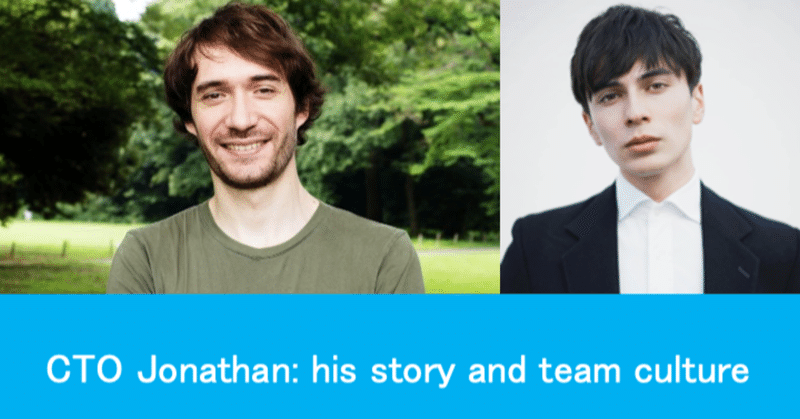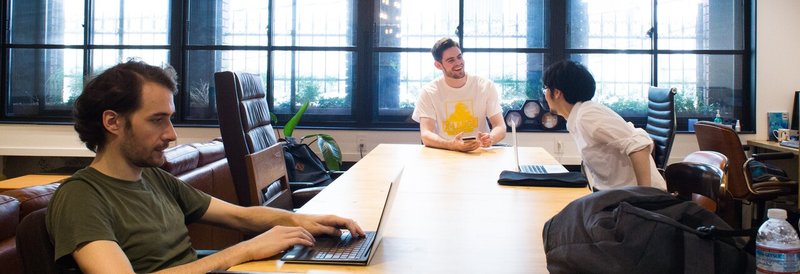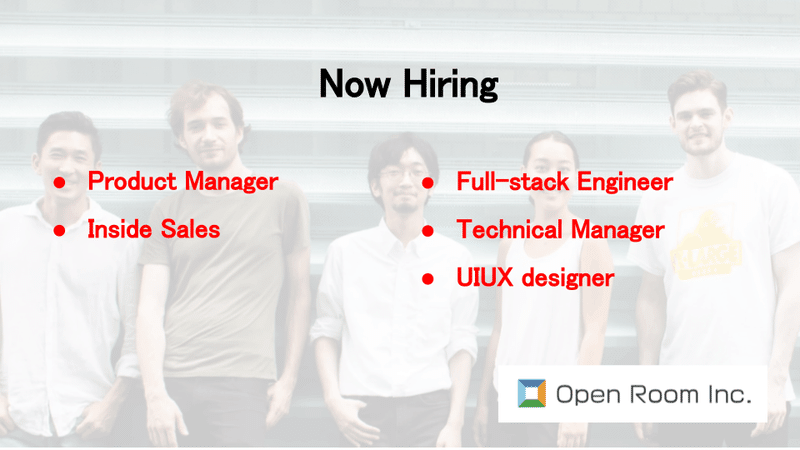
#2 CTO Jonathan: his story and team culture
Hello!
This is Casey, and I’m now working at Open Room Inc. as an internship.
In this series, I aim to show what Open Room is doing through a model, who has no experiences in business, learning Japanese real estate industry, Digital Transformation (DX), and SaaS business in an international startup which tackles the DX in real estate industry that is said one of the most difficult venture in Japan.
As the second theme, I interviewed our CTO Jonathan to ask about his personal stories, the service, and the team culture.
《Looking back on life. How Jonathan became an engineer》

C: I’m glad that finally I can talk to you in person! I heard that you are from France, but which part?
J: Me too! I’m from Dijon in Burgundy, famous for mustard, and went to a university in Paris.
C: What did you study there?
J: I studied IT, especially video game development because I was interested in how everything works behind.
C: So you were already interested in the engineering field. Were you like that from childhood?
J: Actually, not from childhood. In France, you have to choose what to study among literature, economics, and natural science around the age of 14. I didn’t know what I wanted to do, and chose economics because it was the most general thing, and I wasn’t really good at books or math.
C: That’s surprising! I thought you were good at math. Why did you choose to study IT in university then? How did you build your interest toward programming?
J: That’s an interesting question. Sometimes I wonder too. I have to go back in time to when I was 8. My father brought back a PC home, and I have had a strong passion for it ever since. It was not about programming, but I just played games, saw components inside, and built a server to gather players online. I learned programming when I wanted to optimize the game so that I wasn’t really interested in programming itself, but I picked it as a tool.
After finishing high school, I wanted to start working in a random company, but my parents encouraged me to continue studying. Then I chose to study IT in order not to get bored.
C: Interesting. Once you went to the economic field, but you came back to IT, and your hobby became your interest. But why didn’t you make video game development your job?
J: It’s great to have your passion as a job, but on the other hand, it takes the passion away from you. Once it becomes your job, you have to work on the things you don’t really like for days.
C: True. So how did you start your career as an engineer?
J: After the course in university, I continued studying and working at the same time. In France, there is a program in which a company pays a scholarship and you will have a study period and work period. I worked in large companies, but there, I faced the problems of them. They put too many people in a project, the progress and feedback is very slow, they couldn’t expect the rise of smart phones, and they had miss targeting. That’s why I chose to work in a startup company after my graduation.
C: You thought that it’s better to work in a smaller company with rapid reactions.
J: Exactly. I developed a customer support system in the company for 2 years. The work was rewarding, but very stressful at the same time. I worked day and night, and experienced burnout. Once you reach there, you have to take a break or just leave.
C: Really? I lived in France for a year so I know some culture, but it doesn’t sound like France.
J: If it’s a large company with over 100 people, it’s more laid back as the image, but in startup companies, it’s more intense. It’s kind of a trade between being peaceful or learning as much as possible. I learned a lot in the company so that I have zero regret.
C: What is the thing you learned in the experience, and utilizing now?
J: I learned how to step back, and balance out more. In the startup in France, it was a constant rush, and everybody was burning out. Now, I think we found a balance where we go fast, but not too fast. That is more important than technique or knowledge.
C: So even when you have time limit for customizing the service, you have the mind to balance out in order not to bring the burnout to the team.
J: I hope so haha.
《 “Now I feel I’m part of it” How Jonathan Joined Open Room》

C: What brought you to Japan, and to Open Room?
J: I was taking a break from my previous job and traveling Japan because I always wanted to visit. I was also thinking of going back to the professional world, and curious about Japanese startups. I was checking them through a service, and it turned out that the service was actually a recruiting platform and visiting the company meant a job interview.
I had interviews with several companies, but I didn’t feel a strong connection. They say good things such as improving the world, changing the future of children. It created a distance, and I couldn’t get the clear intentions. After all, I had an interview with Toyo.
C: What was your first impression of Toyo, and Open Room?
J: When I met Toyo, I felt he was more honest. He talked about the service that is useful, the opportunity they have, and I felt it was interesting because no one had explored the field. I thought “why don’t I give it a try?'' It also gave me the opportunity to know more about Japan because you can only know part of it from France.
C: How did the impression change as you worked together?
J: Actually it didn’t change much. I still feel the openness and honesty of Toyo and Open Room. What has changed is that now I feel I’m part of it. We have the same objectives from the beginning, but now we know more about us, and it is much more clear how we can reach there. The hard part is already behind us, so we just have to keep going forward.
《Improving the experience of end users: The strength of Forest》

C: What is interesting about developing Forest?
J: The market doesn’t have similar service as we have, so it’s both building and exploring. For me, it is boring to build a similar service as other companies have, and compete. We are opening the opportunity to others to create a new market. That is the fun part.
C: In contrast, what is the difficult part?
J: I think it is the stress. You have to work in a lot of uncertainties, you have to be extremely careful, sometimes go back, set aside what you have done. But after spending some time and looking back, you’ll be healed with what you have attained.
C: That must be a hard thing about engineering in general. What do you think is the key function of Forest?
J: We made the AI automatic Obigae [banner changing] function, which is usually an annoying daily work for real estate agents, in order to attract the users. And then, we introduced a feature to share the properties online with customers. You can see the property well in the Forest with maps on, and it is very comfortable. I think the best feature of Forest is improving the experience of end users.
C: What do you want to attain with the service?
J: It’s hard to tell because there is almost no limit to what we can achieve, but if I would say, make a service known by the general public, and used by real estate agents as their “have to” in operations, such as internet bank transfer in current society.
C: It’s close to how Toyo described as “become the infrastructure of real estate agents”
J: Yes, we have the same goal.
《 “You can do whatever you want to do” the culture of Tech Team》

C: You have Gensuke and Rob in the tech team. How do you divide tasks, and cooperate with each other?
J: I don’t really know how to explain because we don’t have any management principles. In Open Room, it’s more like “you do whatever you want to do”. If you have skills, interest, something you want to build, you can just do it. In the tech team, some of the members take care of marketing or advertisement because they have strong interest in them. In Open Room, we all connect each other somehow in production, tech, and business. We want to keep this culture, and we are doing quite well with it.
C: Indeed. I feel the culture of cooperation more than division.
Using the OCR technology, you have to scan and deal with texts in Japanese, but there is only one native speaker in the team. How did you make it work?
J: Yeah, it’s hard. For some task, we have no choice but to ask Gensuke to do it, unfortunately. But in OCR, since we are scanning text by machine, when there is the original text and extracted text, even someone who doesn't speak Japanese can recognize kanji [a system of Japanese writing using Chinese characters, used primarily for content words]. It takes an insane amount of time, but it's still doable. Then when we validate it, we need a Japanese speaker, of course.
C: I guess there was a huge amount of effort.
J: That’s also why we want to broaden our team. So that we can divide our workload more evenly. I’m sure that they are interesting things to work on, so if more people can be involved in the team, that would be nice.
C: How would you describe Gensuke?
J: He is very skilled, and learns extremely fast. When there are new topics, he can dive in and experiment with complex things in a short time while concerning something that could fail. It’s like a spider web. He has a good capacity to take care of things. It’s thanks to him that we could have come this far with very few bugs and with a small team.
C: How do you describe Rob?
J: Rob is very diligent so that he can focus on the task he decided to work on. I think his biggest quality is how he documents what he worked on. He reports quite well in the progress, and he shares all the knowledge and everything he has implemented. Thus, he prevents the team from wasting time which is very helpful.
C: What kind of person do you want in the tech team?
J: I want more Gensuke, I want more Rob if it’s possible haha.
I want like-minded people who want to learn a lot because that’s what we all are doing.
C: That’s pretty much all, but do you have something that you want to share at last?
J: First of all, I have to thank you, Casey, because I didn’t have a chance to talk about those things.
If there is someone who wants to join us, Open Room is a great place to work so we are more than welcome to see them.
C: Thank you very much! And let’s talk in French sometimes so that I wouldn’t forget it! haha
J: D’accord!
I guess we got the atmosphere of tech team, and saw personality of CTO, Jonathan. Personally, I mainly work with business team so that it was a good opportunity to understand the culture of Tech Team, and I hope some of you got interested in it!
We will continue releasing the interviews of team members so please look forward to them.
Casey

この記事が気に入ったらサポートをしてみませんか?
